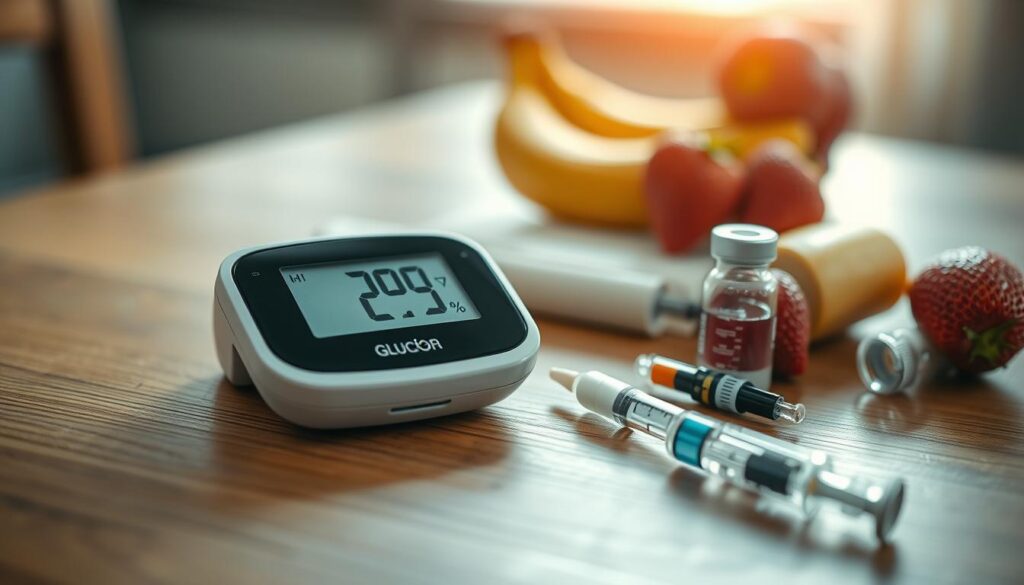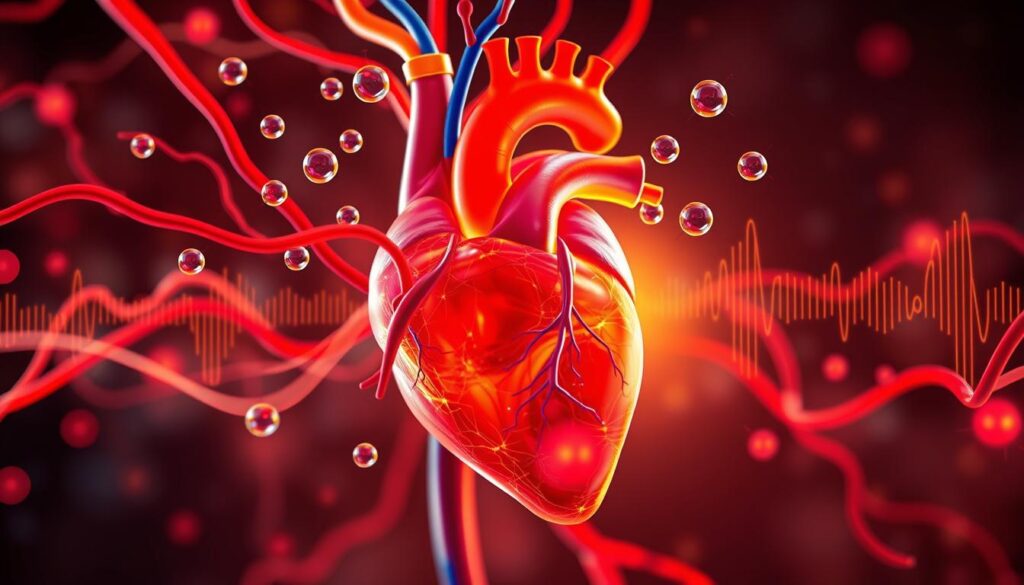High blood sugar and hyperinsulinemia can really affect your heart rate. This is especially true if you have diabetes. Adults with diabetes face a much higher risk of heart disease than those without it.
Keeping your blood glucose levels between 70 and 120 mg/dL is best for those without diabetes.
Hormonal imbalances in diabetes can cause blood sugar to swing. This can directly affect your heart rate. Long-term high blood sugar can harm your heart too.
It’s key to understand how blood sugar and heart rate are connected. This helps keep your heart healthy.
Key Takeaways
- People with diabetes have a significantly higher risk of developing heart disease compared to those without diabetes.
- Ideal blood glucose levels for individuals without diabetes are considered to be between 70 and 120 mg/dL.
- High blood glucose and hyperinsulinemia can have a substantial effect on heart rate, especially for individuals with diabetes.
- Sustained high blood sugar levels in individuals with diabetes can lead to negative effects on the heart over time.
- Individuals with diabetes may experience fluctuations in blood sugar levels that directly impact heart rate.
The Fundamentals of Blood Sugar and Heart Rate
It’s important to know how blood sugar and heart rate are connected. This is especially true for people with diabetes. We’ll look at what’s normal, what’s healthy, and how these two things work together.
Normal Blood Sugar Ranges
For people without diabetes, blood sugar should be between 70 and 120 mg/dL. Staying in this range helps your body work right. But, stress, medicines, and some health issues can mess with this balance.
Healthy Heart Rate Zones
A healthy heart rate for adults is usually under 100 beats per minute. This can change based on how fit you are, your age, and your health. Watching your heart rate can tell you a lot about your heart health.
Key Physiological Connections
Diabetes can make your heart rate go up. This is because of high blood sugar and insulin, and damage to heart and blood vessel nerves. A higher resting heart rate can increase your risk of heart problems.
Knowing how blood sugar and heart rate are connected can help you manage your health. Regular checks, making healthy choices, and talking to your doctor are key. They help keep your blood sugar and heart in good shape.
How Diabetes Affects Your Heart’s Rhythm
If you have diabetes, you might face a higher risk of heart rhythm problems. High blood sugar and insulin levels can make your heart beat faster. This is a sign of trouble.
Diabetes can harm the nerves that control your heart. This can cause your heart to beat in strange ways.
Diabetes can mess with your heart’s electrical system. This can lead to irregular heartbeats, or arrhythmias. These can happen when your blood sugar is too high or too low.
Atrial fibrillation is a common heart rhythm problem in people with diabetes. They are 20-40% more likely to get it. This can raise your risk of stroke and heart problems.
| Condition | Risk Ratio for Atrial Fibrillation |
|---|---|
| Diabetes | 2.13 |
| Atrial Flutter | 2.20 |
| Prediabetes | 1.28 |
It’s key to work with your doctor to manage your diabetes management and cardiovascular wellness. Keep an eye on your blood sugar and heart rate. Also, live a healthy lifestyle to prevent heart rhythm problems.
“Diabetes was found to be a strong, independent risk factor for atrial fibrillation and other cardiovascular diseases.”
Knowing how diabetes affects your heart rhythm can help you stay healthy. Talk to your doctor to make a plan for managing your diabetes. This can lower your risk of heart problems.
The Impact of High Blood Glucose on Cardiovascular Health
High blood sugar affects your heart a lot. Not controlling diabetes management can harm your heart now and later. It’s key to keep your heart healthy and avoid problems.
Immediate Effects on Heart Rate
High blood glucose can make your heart beat faster. Symptoms like dehydration and vomiting can cause this. It can make you feel weak, dizzy, or lightheaded.
Long-term Cardiovascular Risks
Not managing diabetes management well can lead to serious heart issues. High blood sugar can damage your heart’s electrical system. It can also cause plaque buildup in arteries, increasing heart disease and stroke risk.
Warning Signs to Watch
Know the signs that high blood sugar is affecting your heart. Look out for shortness of breath, chest pain, weakness, dizziness, and fainting. If you see these, get help right away.
Watching your metabolic monitoring closely is very important. Knowing how blood glucose affects your heart is key. By managing your diabetes well, you can keep your heart healthy and live better.
Blood Sugar and Heart Rate: Understanding the Connection
The link between glucose monitoring and cardiac health is deep. Research shows how blood sugar and heart rate are connected. A study with 11,140 type 2 diabetes patients found a link between high heart rate and more deaths and heart problems.
Those with heart attacks or strokes before had the highest risk. The study found heart rates from 33 to 140 bpm. Women had a bit higher heart rates than men, and older people had lower rates than the young.
This study shows why we need to watch both blood sugar and heart rate. By keeping an eye on these, people with diabetes can stay healthy and avoid bad outcomes.
“A higher resting heart rate was linked to a significantly increased risk of all-cause mortality, cardiovascular death, and major cardiovascular events in patients with type 2 diabetes.”
The study found the biggest risk in those with heart problems before. This means we must watch glucose levels and heart rate closely in diabetes patients. Knowing this helps doctors and patients work together to keep hearts healthy.

Metabolic Monitoring and Heart Health
Keeping your body’s health in check is very important. Checking your blood sugar and heart rate often helps a lot. It lets you know how your body is doing and helps you make better health choices.
Blood Sugar Testing Methods
Testing your blood sugar is key if you have diabetes. Home devices let you check your sugar levels all day. They show how your body reacts to what you eat and do.
Heart Rate Monitoring Tools
Watching your heart rate is also very important. There are many tools to help you do this. They show your heart’s rate, helping you stay fit and healthy.
Recording and Tracking Progress
It’s important to keep track of your health often. By recording your health data, you can spot trends and make changes. This helps you manage your health better, reaching your goals.
| Metric | Recommended Range | Significance |
|---|---|---|
| Blood Sugar (Fasting) | 80-130 mg/dL | Indicates healthy glucose regulation |
| Blood Sugar (After Meals) | Less than 180 mg/dL | Prevents post-prandial spikes that can harm the heart |
| Resting Heart Rate | 60-100 bpm | Reflects a well-functioning cardiovascular system |
By checking your glucose monitoring and heart rate tracking often, you learn a lot. Using wearable technology helps you make smart health choices. This keeps you healthy and feeling good.
The Role of Insulin in Heart Function
Insulin is a key hormone made by the pancreas. It helps control the heart’s function. When insulin levels are off, it can harm the heart. Knowing how insulin and the heart are connected is key for those with diabetes management and keeping the heart healthy.
Insulin resistance makes the body’s cells less responsive to insulin. This can lead to heart rhythm problems, like arrhythmias. These issues can start years before someone is diagnosed with diabetes. Research shows insulin resistance is linked to heart problems, like atrial fibrillation.
“A one-point rise in A1c levels can increase the chances of cardiovascular disease by up to 18%.”
Managing insulin well is crucial for heart health in people with diabetes. When insulin levels are controlled, it lowers the risk of heart problems. This improves the heart’s function overall.

Studies show insulin’s role in heart function is vital. In animal studies, insulin, glucose, and potassium (GIK) improved heart function. They helped the heart work better after a heart attack.
Understanding insulin and the heart’s connection helps people with diabetes manage their insulin levels. This reduces the risk of heart problems. Regular checks, lifestyle changes, and medical care are important for a healthy heart and better health.
Risk Factors and Prevention Strategies
People with diabetes need to watch their heart health closely. Things like being out of shape, being overweight, smoking, and high blood pressure can harm your heart. But, you can protect your heart by using good prevention strategies.
Lifestyle Modifications
Changing your lifestyle can really help. Exercise regularly to keep your blood sugar and heart healthy. Quitting smoking is also key. Your heart risk drops right away, and after a year, it’s much lower than a smoker’s.
Dietary Considerations
It’s important to keep your blood sugar in check and follow your insulin plan. Talking to doctors about a healthy diet is also crucial. Eating right can help your heart and manage your diabetes. Staying at a healthy weight is also important for your heart.
Exercise Recommendations
Exercise is key for heart health, especially for diabetes patients. Doing moderate to hard exercise can lower your heart attack and stroke risk. Try to do 150 minutes of moderate or 75 minutes of hard exercise a week. Adding activities like meditation and yoga can also help.
By making lifestyle changes, eating right, and exercising, you can manage your heart and diabetes. This can lower your risk of heart problems and improve your health.
Modern Technology for Glucose and Heart Rate Monitoring
Wearable tech has changed how we track glucose and heart rate. Now, you can see your blood sugar levels in real time. This helps you make better choices about what you eat and how you live.
These devices work with apps on your phone. They show how your glucose levels change all day. This helps you manage your diabetes or keep your glucose levels healthy.
Fitness trackers and smartwatches are also key for heart rate tracking. They watch your heart rate all the time. This gives you important info about your heart health.
By knowing how your blood sugar and heart rate connect, you can improve your health. You can make choices that help your heart and reduce heart problems.
With this tech, you can look at your health in a new way. You get real-time info to help you make smart choices. This lets you work with your doctor to manage your diabetes and keep your heart healthy.


A Life-Changing Experience with This Weight Loss Supplement (Nagano Tonic)
I’ve always struggled with finding a weight loss solution that actually works for me. Like many, I’ve tried numerous diets, exercise routines, and supplements over the years—some worked for a short time, but nothing ever gave me long-term results. That was until I decided to try the weight loss supplement I found : Link to the Supplement.
From the moment I started using it, I noticed a difference. Not only did I feel more energized, but my cravings also became more manageable. The best part? I started seeing results much quicker than I anticipated! Over the course of just a few weeks, I noticed a significant reduction in belly fat and overall weight loss that I hadn’t been able to achieve before.
What makes this supplement stand out from all the others I’ve tried is how it supports me in my daily routine without any jitters or energy crashes. I’m able to stay focused and motivated, which has made it easier to stay on track with my diet and exercise plan.
This product truly exceeded my expectations, and I feel more confident and healthier than ever before. If you’re struggling with your weight loss journey like I was, I highly recommend giving this supplement a try. It’s been a game-changer for me, and I’m sure it can work wonders for you too!
Contant Them on email .. tonicnagano50@gmail.com
I’ve tried so many weight loss products over the years, but nothing worked like this supplement! Since I started using it, I’ve noticed a big difference in my energy levels and appetite control. In just a few weeks, I’ve lost weight and feel so much better. It’s been easy to stick with, and the results speak for themselves. Highly recommend this to anyone looking to make a real change!
This Nagano Tonic has been amazing! In just a few weeks, I’ve lost weight, feel more energized, and my cravings are under control. Highly recommend it!
Thats the link to purchase http://surl.li/iasppy